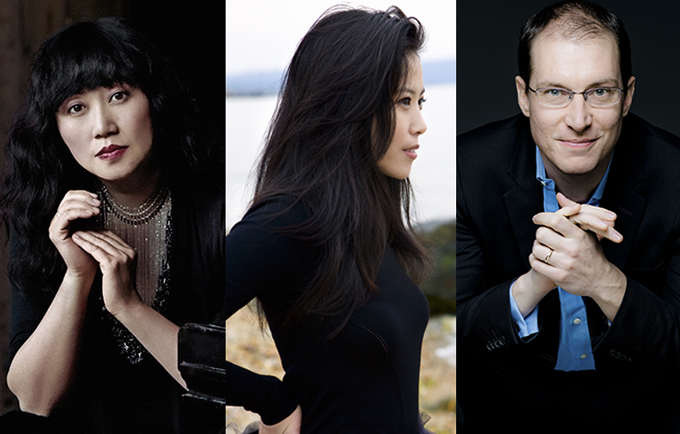Wu Han leads a dazzling piano finale to close her first Wolf Trap season

Wu Han, Gloria Chien and Gilles Vonsattell closed the Wolf Trap chamber season Friday night with a program of four-hand piano music.
The repertory for four hands is special to pianists’ hearts–music that is both orchestral in scope and as intimate as a conversation on a loveseat.
Wu Han concluded her first season as artistic adviser for the chamber music series at Wolf Trap with a program devoted to such music. Two other pianists, Gloria Chien and Gilles Vonsattel, joined her in the Barns Friday night, in a rotation of combinations on the primo and secondo parts.
Chien and Vonsattel opened the evening with Mozart’s Andante and Five Variations in G Major. Vonsattel, playing the lower secondo part, was too forceful at times for Chien’s more delicate sound in the early sections. It is traditional for the second player to control the sustaining pedal in four-hands playing, because his right foot is closer to it. In this role Vonsattel had trouble pedaling for Chien’s melodic lines, sometimes muddying her part.
The penultimate variation, set in the minor mode, was a highlight as the duo’s inner hands negotiated their close-set chords with balletic grace. The balance between primo and secondo was better in the final variation, too, with Vonsattel allowing Chien’s evanescent right hand to glide effortlessly through its delicate lines.
Vonsattel was paired more advantageously as primo to Wu Han’s secondo in Schubert’s Fantasy in F Minor, one of the undisputed triumphs of four-hands music. Their attacks were crisp and unified in the first movement, with its tragic theme outlined gorgeously by Vonsattel. The trills and dotted-rhythm chords of the second movement proved more difficult to keep together. The Scherzo hit just the right tempo, brilliant and tempestuous, with Wu Han thundering away on the bass part before the return of that sad, lonely first theme.
The same pairing sat right back down again for Mendelssohn’s Andante e Allegro Brillant. In the first section the two parts trade off solo bits antiphonally, requiring one musician to lean back out of the way as the other took control of the whole keyboard. Vonsattel even took over the sustaining pedal on his responses, an additional element of coordination as he and Wu Han overlapped almost seamlessly. The virtuosic conclusion of the piece, notes whirring away at a dizzying tempo, was a tour de force from both players.
The Viennese theme for this season was jettisoned for one of the most infamous pieces ever written for four hands, The Rite of Spring. Stravinsky conceived this version to show the score to its conductor, Pierre Monteux, and for the ballet company to use in rehearsal.
Claude Debussy played secondo to Stravinsky’s primo at the arrangement’s private premiere, leading Wu Han to introduce it on this concert with a much more serene piece by Debussy, the Petite Suite. Chien and Vonsattel gave the work a moonlit touch in the whimsical first movement, becoming more spritely in the second movement. The duo had an excellent cooperative sense of rubato here, with Vonsattel tending to rush ahead in the third and fourth movements.
Nothing in this charming evening thus far could quite have prepared a listener for the onslaught that was to come in the Stravinsky. Chien took the secondo part here, wielding a surprisingly massive amount of power on the hammered “Augur” chords. She and Wu Han approached this piece with strict, deliberate ensemble rhythm, which added to the savagery of the story, as the pagan tribe selects one of its own children to be offered in sacrifice to the violent god of spring.
Going against tradition, Wu Han controlled the sustaining pedal while playing the primo part. During the intermission interview with the artists, made for Wolf Trap’s regular radio broadcast, she described the discomfort of having someone else pedal for you as “like having someone brush your teeth.” Chien joked in turn that “When you play with Wu Han, Wu Han does the pedaling.”
Even with the offbeat distribution of duties, the performance was rock solid. The transparent playing in the opening sections of the second part of the ballet, as the troupe of young girls dances in mysterious circles, was murky and spellbinding. Again powered by the bloodthirsty violence of Chien’s playing on the lower keys, the masses of dissonance and rhythmic drive of the ballet’s murderous conclusion were jarring, even shocking.
One can only imagine the impression the arrangement made on its listeners, at a time when the orchestral version of the piece had yet to be premiered. Not for nothing, Debussy later recalled that this music haunted him “like a beautiful nightmare.”
Wu Han’s second season at Wolf Trap features cellist David Finckel, the Escher String Quartet, pianist Jeffrey Kahane, the Brentano String Quartet, and much more. wolftrap.org; 877-965-3872


